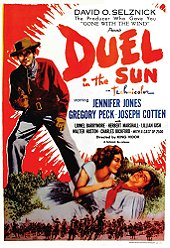Super-producer David O. Selznick intended to follow-up his gargantuan success of Gone with the Wind with this epic horse opera. Much like that Oscar adorned production, Duel in the Sun lacks a strong directorial signature and instead is the product of Selznick’s outsized ambition and vision. Selznick intended to top that prior film with this one, and while he misses the mark on an artistic level, he still managed to create a film of pulpy, overheated allure and one that is far more fascinating for its vast strangeness and faintly ridiculous melodramatics.
Those may sound like criticisms, but I find them to be engaging strengths throughout Duel in the Sun. The main thrust of the story is a love triangle that throbs with repressed emotions and mutually assured destruction, and a bevy of subplots to try and expand the scope and make the main story more respectable (a character’s casual racism, a train being built) are anemic in comparison. Face it, it’s just more fun to watch Jennifer Jones whip herself into a frenzy and crawling over rocks in a climatic shootout.
The story is lurid from the beginning with Jones cast as a mixed-race young woman named Pearl. Her father murders her mother when he finds her in bed with another man, and he ends up sending her away to a former lover (Lillian Gish) and her family (Lionel Barrymore, Gregory Peck, and Joseph Cotten). While living with them, Pearl finds herself the object of scorn from Barrymore’s casual racism, kindness from Gish’s matriarch, and of lust between the good son (Cotten) and the bad one (Peck). We follow her as she tries to navigate the emotional and sexual terrain of this ranch, and the effect is like watching someone trying to gingerly walk across broken glass.
For all of the giddy chaos on display throughout Duel in the Sun, it’s the acting that tries to keep the center together. Jones had a strong run of roles throughout the 40’s having won an Oscar for her second film role in The Song of Bernadette, and following that up with three consecutive nominations (Since You Went Away, Love Letters, and this film). Yet no film quite captures or demonstrate just how wide her range was like this one. She plays the full gamut from innocent ingénue to robustly physical temptress and winding up as a feral avenger in the final moments. Jones thrust her full body into the part, and she frequently threatens to go full-on camp yet she emerges as a dangerous live-wire. It’s an essential piece of work for the actress.
Matching her every step of the way is Gregory Peck cast brilliantly against type as the lurid bad boy. We expect decency and a strongly held moral conviction from him, think of To Kill a Mockingbird or Gentleman’s Agreement, so it’s a bit shocking to see him play such a rascal. He’s clearly having fun playing the villain, and it’s an essential role for him for how fully he embodies and realizes this bastard. Joseph Cotten doesn’t get as much to do as the good boy, but the part launched him as a viable romantic lead where we’re so used to see him playing oily, think of Gaslight.
Lionel Barrymore, Lillian Gish, and Walter Huston bring their finely honed sense of acting styles to their parts. Huston gets to play an amoral preacher who gets a little too happy watching Jones’ Pearl get down on her knees to repent, and the elder statesman plays it broadly but still with a core of honesty and truth. While Barrymore and Gish get many of the most dramatically valid scenes to play out. Gish’s final hour confrontation and death scene is a particular standout as she drapes her body and drags it slowly across the room like a ragdoll trying to gain sentience. She got her lone Oscar nomination for this film, which is a shocking bit of trivia for an actor of her stature and power but well-deserved for her emotional richness and commitment in the part.
Even when Duel in the Sun flirts with going off the rails, which is often, it contains more pure film-making and movie-making mythology in every frame than many of its more respectable contemporaries. There’s a vitality on display here, and the massive amount of creative talents circling behind-the-scenes create individual moments of heightened artistry that is indelible. For instance, Josef von Sternberg provided his mastery of lighting and craft to help with Jones’ numerous close-ups. Selznick wanted them to look more exotic and alluring, and who better to help with that then the man who crafted Marlene Dietrich’s most iconic looks?
Director King Vidor managed to keep several of the moments working and thoroughly engaging, even if he was driven off the project by Selznick penchant for memos and reshoots. He was replaced by William Dieterle and who knows who else. But Vidor’s essence as a film-maker energizes several moments, and the climatic shootout has to be one of them. The thing works, despite all odds and evidence that it should. Jones and Peck, having spent the better part of the movie alternating between fucking and fighting, finally confront each other. They unload not only their guns into each other but their long harbored resentments, and eventually crawl towards each other declaring their love and dying in each other’s arms. It is utterly preposterous, but exactly the kind of spectacle that makes going to the movies so worthwhile.
 Login
Login